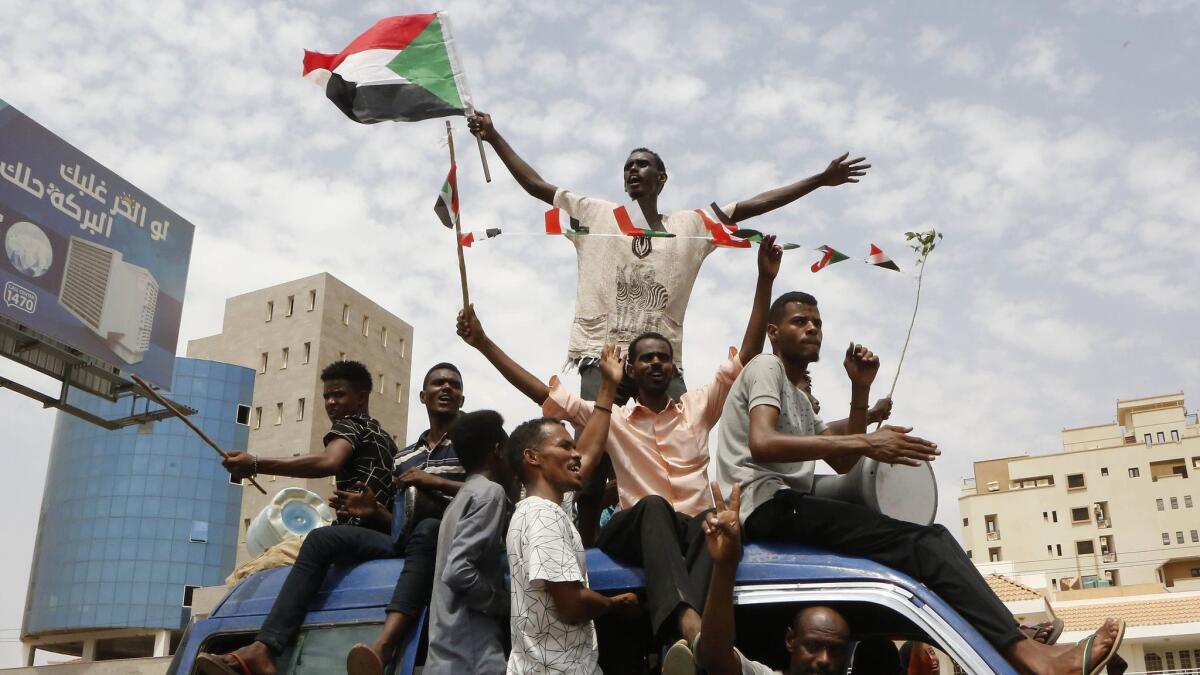Sudan protesters and military reach a power-sharing deal

- Share via
Reporting from Khartoum, Sudan — Leaders of Sudan’s pro-democracy movement on Friday welcomed a new power-sharing agreement with the ruling military council as a victory for their “revolution,” raising hopes for an end to the deadly violence amid a three-month standoff with the generals.
The emerging deal could break the political impasse that has gripped the country since the military ousted longtime autocrat Omar Bashir in April amid an uprising against his rule.
“Today, our revolution has won and our victory shines,” said a statement posted early Friday on the Facebook page of the Sudanese Professionals’ Association, which has spearheaded the protests.
Talks on a power-sharing agreement had collapsed when security forces razed a protest camp outside the military headquarters in Khartoum on June 3. More than a hundred people were killed since then, according to the protesters.
In the ensuing weeks, protesters stayed in the streets demanding that the generals hand power to civilian leadership, to no avail.
But early on Friday, the two parties agreed to form a joint sovereign council — previously a sticking point in the talks — to lead the country during a transition period of three years and three months, said the SPA statement.
The council will include five civilians representing the protest movement and five military members. An 11th seat will go to a civilian chosen by both parties.
A military member will preside over the council during the first 21 months, followed by a civilian member after, according to the statement.
This suggests a significant concession on the part of pro-democracy forces, which had insisted that the sovereign council have only a civilian president. However, the deal did secure another key demand — that protest leaders select the members of a technocratic cabinet to be formed independently from the generals.
The African Union and Ethiopia made intensive efforts to bring the generals and the protesters back to the negotiating table.
Negotiations resumed earlier this week after tens of thousands of demonstrators flooded the streets of Sudan’s main cities over the weekend in the biggest show of numbers since the razing of the protesters’ sit-in camp. At least 11 people were killed in clashes with security forces, according to protest organizers.
When news of the deal broke around dawn on Friday, hundreds of protesters returned to the streets dancing, singing and waving Sudanese flags, while passing drivers honked.
The military-controlled Al-Sudan television channel played national songs. It also reran excerpts of the press conference announcing the agreement, held jointly by protest and military leaders, which it subtitled “Congratulations to the Sudanese people.”
“We hope that the formation of transitional institutions marks the beginning of a new era,” said Omer El-Digair, a leader of the Forces for the Declaration of Freedom and Change, a political coalition representing the protesters. He spoke at a joint news conference with the military and African mediators following the conclusion of the deal. “We hope it is an era where we can shut off the sound of pistols and destroy for good prisons of arbitrary detention.”
According to the SPA statement, the two parties also agreed to launch “a national independent investigation” into the killing of protesters since Bashir was ousted, according to the statement.
“I am not fully satisfied but it is a step forward to bring peace to our people,” Tarek Abdel Meguid, an FDFC leader, told The Associated Press.
More to Read
Sign up for Essential California
The most important California stories and recommendations in your inbox every morning.
You may occasionally receive promotional content from the Los Angeles Times.













